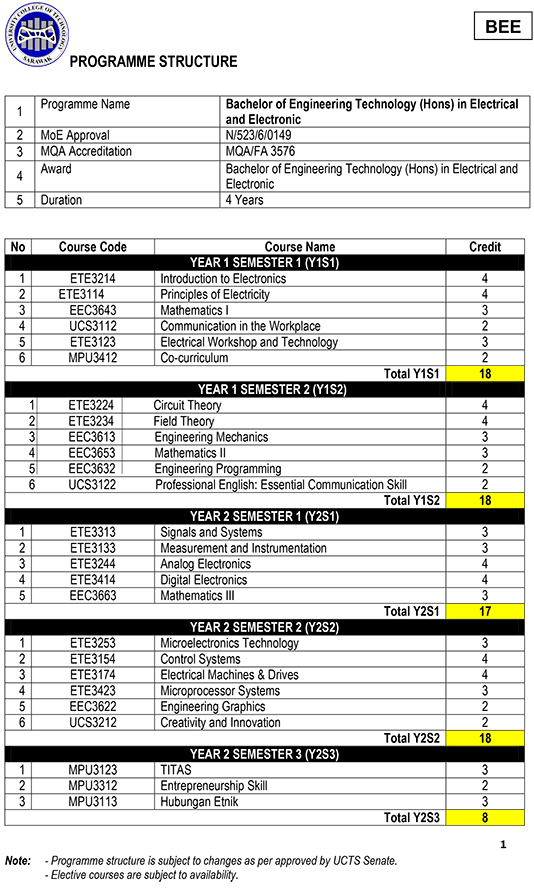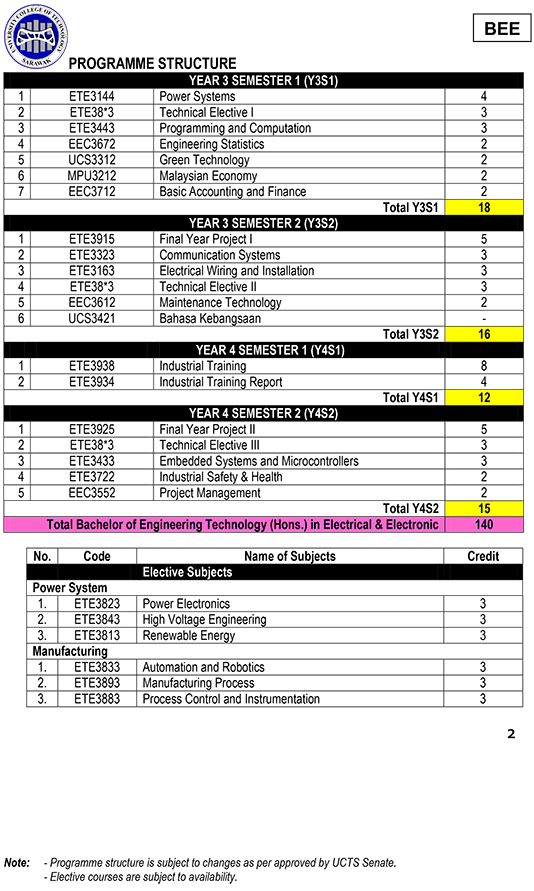[N/523/6/0149] [9/18] [MQA/FA3576]
Bachelor of Engineering Technology (Hons) in Electrical & Electronic
Programme Overview
The Programme aims to equip students with various skills necessary to adapt to new scientific knowledge of new products. Technical elective subjects are offered in the senior year to provide some degree of specialization (in high voltage engineering, automation and robotics, marine electrical and electronics), but all graduates receive a well-rounded basic education in electrical and electronic design principles.
Engineering Technology is a profession in which knowledge of mathematics and natural science is devoted primarily to the implementation and extension of existing technology for the benefits of humanity. This profession deals with the same topics as engineering, but the knowledge is more applied, as opposed to purely theoretical knowledge. They are most likely to get a ‘hands-on’ laboratory, testing, construction, or in the field job. The level of maths and science required in Engineering Technology is not theoretical as that required in engineering. Instead, it is more focused on applications. This programme has obtained full accreditation from the Malaysian Qualification Agency (MQA). Click here to view the accreditation.
Programme Aims
To create alumni with broad technical knowledge and associated hands-on skills in electrical and electronic engineering technology to fulfil their professional demands in highly competitive global markets with confidence, outstanding ethical and moral values.
Programme Educational Objectives (PEOs)
- Graduates will use the latest knowledge and techniques of engineering technology to solve engineering technology problems (PLO 1, 2, 3, 4, 5)
- Graduates will have potential of strong leadership, management and teamwork skills, and able to communicate effectively in diverse teams (PLO 6, 7, 8)
- Graduates will embody a commitment to professional ethics, diversity and social awareness in their professional career, and able to continue learning independently in the acquisition of new knowledge and skills. (PLO 9, 10, 11, 12)
Programme Learning Outcomes (PLOs)
At the end of the programme, graduates should be able:
- To apply knowledge of mathematics, science, engineering fundamentals in electrical and electronic engineering principles
- To solve engineering problem systematically using appropriate method and technique
- To apply systematic approach in electrical and electronic engineering technology design works
- To select and apply techniques, resources and modern engineering tools, with an understanding of their limitations
- To plan and conduct experimental to investigate problems using data from relevant sources
- To function effectively as individuals, and as members or leaders in diverse technical teams
- To communicate effectively with the engineering community and society at large
- To demonstrate an awareness of management, business practices and entrepreneurship
- To demonstrate an awareness of and consideration for societal, health, safety, legal and cultural issues and their consequent responsibilities
- To demonstrate an understanding of professional ethics, responsibilities and norms of engineering technology practices
- To appreciate the impact of sustainable development in electrical and electronic engineering technology practice
- To recognize the need for professional development and to engage in independent and lifelong learning
Strength Of The Programme
- Balance of theory and practical approach
50% of teaching and learning hours is allocated for practical - Comprehensive coverage of programme contents
The syllabus covers from the fundamental to in-depth in the discipline - Industrial-based design of curriculum
Teaching material, problem solving, case study, and industrial projects - Practical industrial training
6-month training duration in the final semester of the programme. - Industrial relevant technical electives
Taught by the professionals for marine electrical and electronics, renewable energy, high voltage engineering, and etc - Value-added certificates are available
Electrical Wiremen Certification, Network Associate Certification, Safety Certificate, and etc
Careers In Electric & Electronic Engineering
Graduates of the programme will find a job market with many opportunities of interesting and challenging careers. Opportunities can be found in the areas of computer interfacing and networking, electrical wiring design and installation, industrial machinery and equipment, measurement and instrumentation, development engineering, manufacturing, product engineering, field service, energy management, quality control, technical sales, or management. These opportunities can be found in a variety of firms engaged in electronic manufacturing, industrial control, applications engineering, and in power utilities.
Accreditation
Bachelor of Engineering Technology (Hons) in Electrical and Electronic has obtained full accreditation from the Malaysian Quality Agency (MQA) [MQA/FA 3576]
Entry Requirements
- Pass STPM/A-level with full pass in Mathematics and Physical Science; or
- Pass UEC with five (5) Grade B’s including Mathematics and Physical Science; or
- Pass Matriculation / Pre-U/ Foundation in Science from recognised institutions with minimum CGPA 2.0; or
- Pass Diploma in related field from recognised institutions with minimum CGPA 2.0; or
- Other equivalent qualifications recognised by the Malaysian Government
Tuition Fees
Programme Structure and Synopsis
Click Here to download synopsis
Study loans are available from PTPTN. The tuition fees above are only applicable to local / Malaysian students. For more details and information, please contact our Marketing Office at (+6) 084-367300 or email to enquiry@uts.edu.my.



